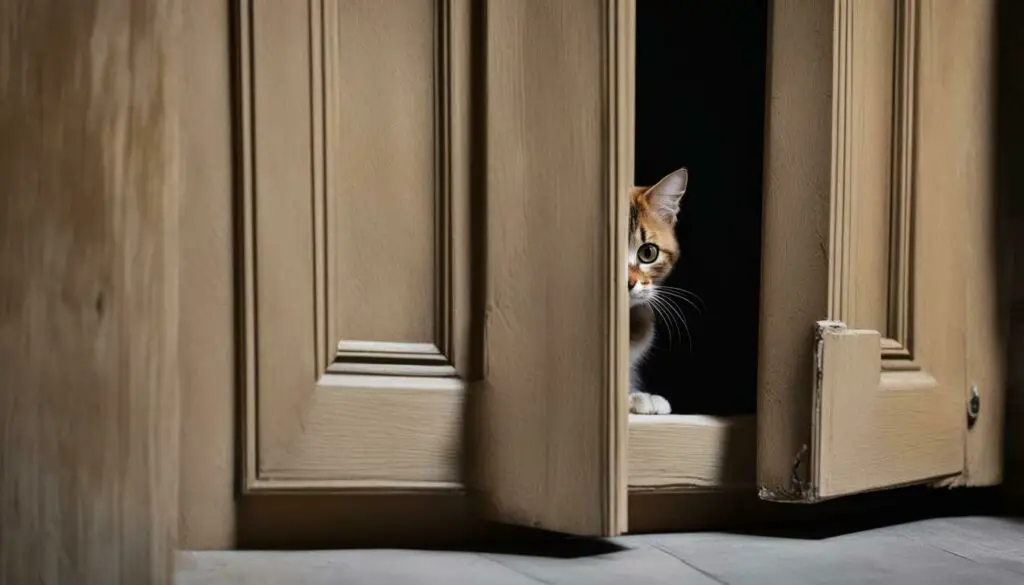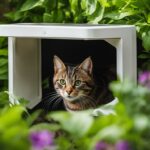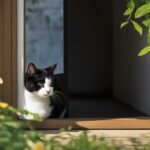Have you ever wondered why your cat goes crazy when a door is closed? It’s a common behavior among felines, and understanding their aversion to closed doors can help us better understand our furry friends. Cats’ dislike for closed doors is driven by their curiosity and social nature, as well as their desire to be included in all family activities. They may scratch or meow at closed doors as a way to express their longing to explore and be a part of every space. While this behavior can be frustrating, it’s important to remember that cats are not doing it to annoy their owners but rather as a natural response to their environment.
Keeping doors open whenever possible can help alleviate a cat’s distress and fulfill their need for exploration. However, sudden changes in a cat’s behavior or signs of distress should not be ignored. If you notice any concerning behavior, it’s best to consult a veterinarian or veterinary behaviorist who can provide professional guidance and support.
Key Takeaways
- Cats dislike closed doors due to their curiosity and desire to explore.
- Closed doors may be perceived as barriers to a cat’s territory and social involvement.
- Scratching or meowing at closed doors is a way for cats to express their desire to be included.
- Keeping doors open whenever possible can help alleviate a cat’s distress.
- If a cat’s behavior suddenly changes or is accompanied by signs of distress, consult a veterinarian or veterinary behaviorist.
The Curiosity Behind Cats’ Aversion
Cats are naturally curious creatures, always on the lookout for hidden mysteries. This curiosity is often the driving force behind their aversion to closed doors. Behind every closed door lies the possibility of something new and exciting, and cats simply cannot resist the urge to investigate.
Whether it’s the enticing smell of a freshly cooked meal emanating from the kitchen or the sound of laughter and conversation coming from another room, cats want to be a part of it all. Closed doors represent an obstacle standing between them and the unknown, fueling their curiosity even more.
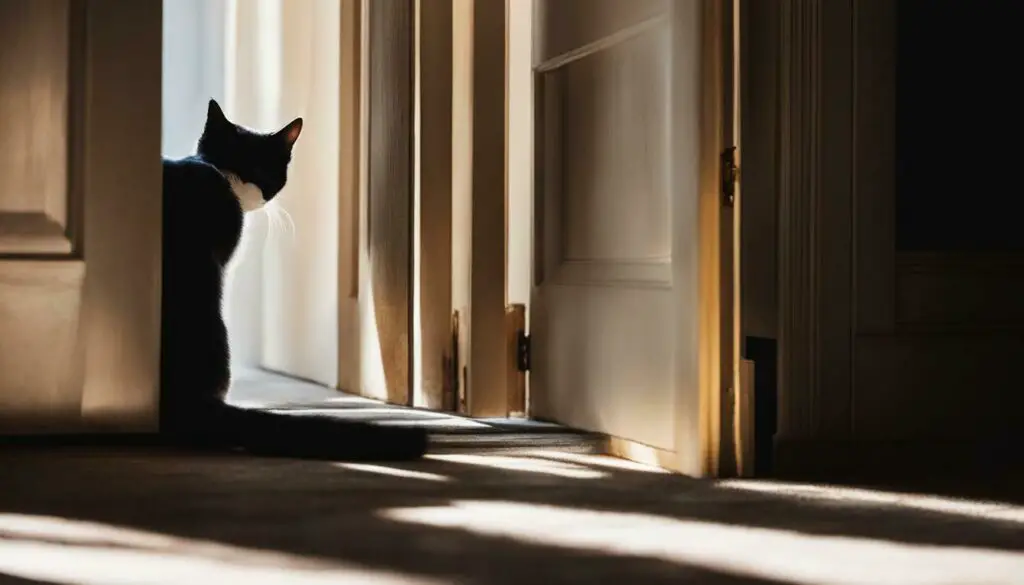
It’s important to remember that cats are social creatures who thrive on being involved in their family’s activities. Closed doors can be seen as a barrier, excluding them from the action and territory they consider their own. In an effort to express their desire to be included, cats may resort to scratching at the door or meowing loudly, hoping to grab the attention of those inside.
The Appeal of an Open Door
By keeping doors open whenever possible, we can help alleviate a cat’s distress caused by closed doors. By giving them access to the spaces they long to explore, we’re satisfying their curiosity and providing a sense of inclusion. This small adjustment can make a big difference in their overall well-being and contentment.
However, if a cat’s behavior towards closed doors suddenly changes or is accompanied by signs of distress, it is advisable to consult a veterinarian or veterinary behaviorist. These professionals can help identify any underlying issues causing the aversion and provide appropriate guidance and solutions for both the cat and their owners.
In the end, understanding and embracing cats’ unique quirks, including their aversion to closed doors, is essential to cultivating a harmonious relationship with our feline companions. Let us celebrate their individuality and find joy in the endless mysteries they bring into our lives.
Social Nature and Territorial Perception
Cats are social beings who want to be part of every family activity. They thrive on human interaction and feel the need to be involved in everything that goes on around them. Closed doors can pose a challenge for cats, as they may perceive them as barriers to their territory.
From a cat’s perspective, closed doors imply exclusion from a space that they consider their own. This can lead to feelings of frustration and distress, prompting them to exhibit behaviors like scratching or meowing to express their desire to be included. Their territorial nature plays a role in their aversion to closed doors, as they feel the need to maintain control over their living environment.
To understand the effect of closed doors on cats, it’s important to acknowledge their social hierarchy in a household. Cats often view themselves as equal family members and seek inclusion in all activities. Closed doors disrupt this dynamic, leaving cats feeling left out and anxious.
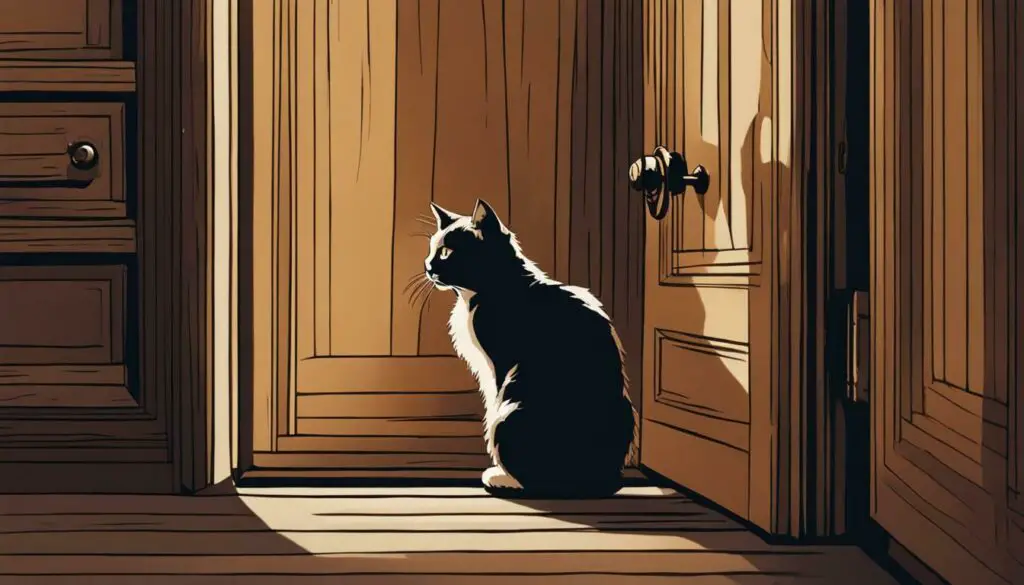
Cats’ dislike of closed doors can be a source of frustration for both cats and their owners. It is essential for cat owners to recognize that their cats are not exhibiting this behavior to annoy them, but rather as a means of expressing their desire to be a part of every space. Keeping doors open whenever possible can help alleviate a cat’s distress and maintain their sense of inclusion within the household.
| Ways to Alleviate a Cat’s Distress: |
|---|
| 1. Install a pet door or use door stoppers to allow cats easy access to rooms |
| 2. Create designated safe spaces for cats within the home |
| 3. Use positive reinforcement techniques to encourage cats to stay in preferred areas |
| 4. Provide interactive toys and scratching posts to keep cats engaged and entertained |
It is important to keep in mind that sudden changes in a cat’s behavior or signs of distress should not be ignored. Seeking professional help from a veterinarian or veterinary behaviorist can ensure that any underlying issues causing a cat’s aversion to closed doors are addressed.
Expressing the Desire to Be Included
Cats have various ways of communicating their desire to be a part of every space. When faced with a closed door, they may resort to scratching or meowing, hoping to catch their owner’s attention and be granted access to the mysterious room. This behavior is not intended to annoy or frustrate their owners; rather, it is an innate expression of their social nature and need for inclusion.
“A closed door is like a barrier to a cat’s curious and adventurous spirit,” says Dr. Emily Anderson, a renowned feline behaviorist. “They want to explore every nook and cranny, be involved in family activities, and feel like an integral part of the household.”
This desire to be included is deeply ingrained in a cat’s instincts. Whether it’s the kitchen, living room, or even the bathroom, cats want to be wherever their owners are. Closed doors can be perceived as withholding the opportunity to explore, investigate, and satisfy their natural curiosity. So, the scratching, meowing, and pleading looks are not an attempt to inconvenience us; they are simply an expression of their longing to be included.
| Ways Cats Express Their Desire to Be Included: |
|---|
| Scratching at the door |
| Meowing loudly |
| Pawing or nudging the doorknob |
| Sitting or lying by the closed door |
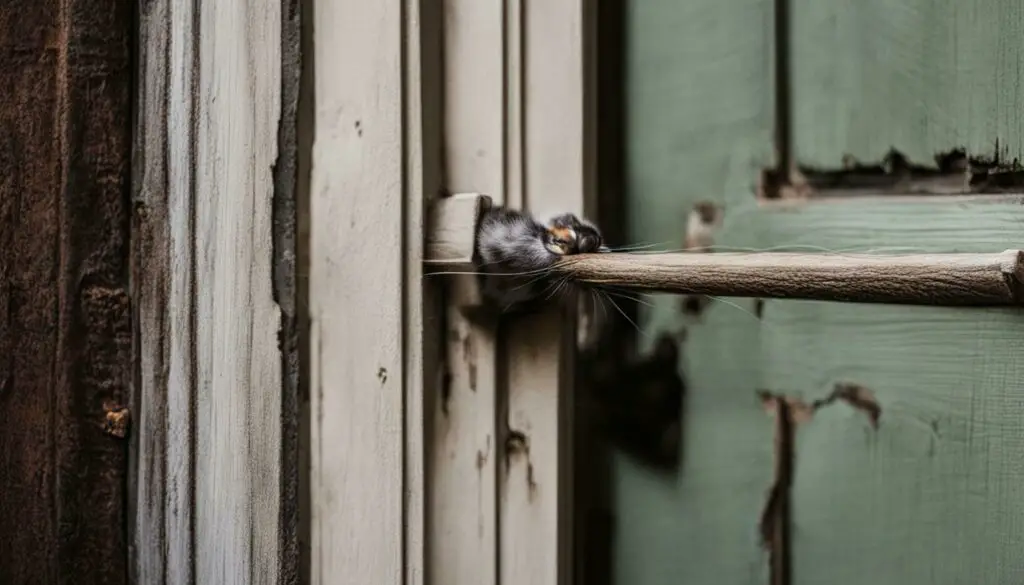
As a cat owner, it’s essential to understand and empathize with your feline companion’s desire to be included. Simply opening doors whenever possible can go a long way in reducing their distress and maintaining a harmonious relationship. Remember, by embracing your cat’s need for inclusion, you are fostering a stronger bond and ensuring their overall well-being.
Frustrations for Both Cats and Owners
Dealing with cats’ dislike of closed doors can be challenging for both owners and their feline companions. This common quirk among cats often leads to frustration and confusion on both sides. While cats’ aversion to closed doors may appear irrational to us, it is essential to understand the reasons behind their behavior.
Cats’ curiosity drives them to explore what is happening behind closed doors. They have an innate need to investigate and be part of every activity in their surroundings. Closed doors act as barriers to their territory, which can make them feel excluded and left out. In response, cats may scratch or meow at closed doors, expressing their desire to be included.
For cat owners, the constant scratching and meowing at closed doors can be exasperating. However, it is essential to remember that cats are not doing this to annoy their owners intentionally. Instead, they are trying to communicate their need to be part of the family and their environment. Understanding this can help foster a more harmonious relationship between cats and their owners.
| Signs of a cat’s distress due to closed doors: | Ways to alleviate a cat’s distress: |
|---|---|
|
|
Quote:
Understanding and accommodating cats’ aversion to closed doors is crucial for maintaining a healthy and happy bond with our feline friends.” – Cat Behavior Expert
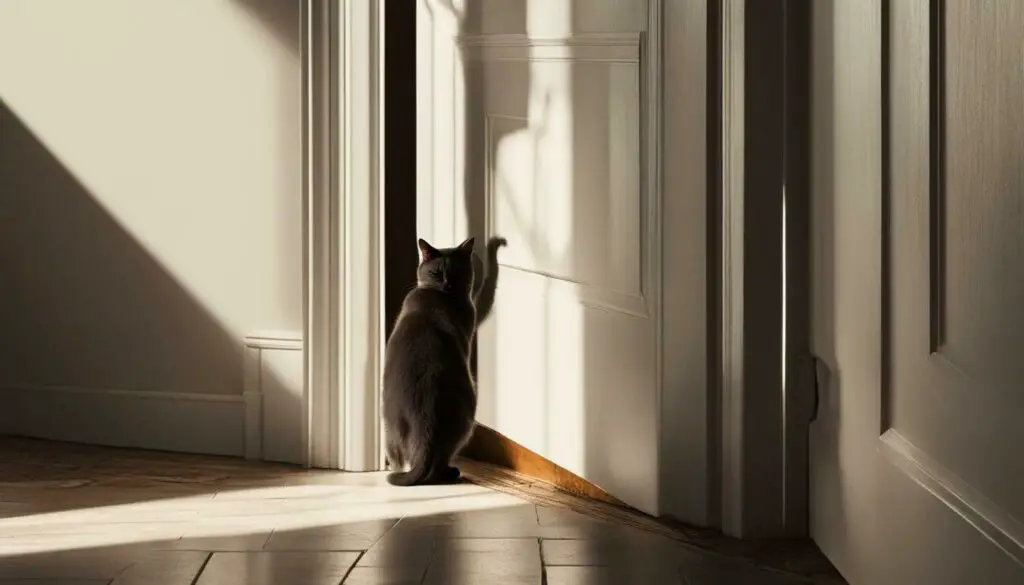
Alleviating Cats’ Distress
There are ways to help your cat feel more at ease when encountering closed doors. Understanding their aversion to closed doors is the first step in addressing their distress. One approach is to make sure they have access to multiple rooms in your home, allowing them to move freely and explore different spaces. This can help alleviate their curiosity and desire to investigate what lies behind closed doors.
Cats are social creatures, so it’s essential to include them in your daily activities. Consider incorporating interactive playtime sessions and providing them with toys and scratching posts to keep them engaged and entertained. Creating a stimulating environment can distract them from their dislike of closed doors and make them feel more involved in their surroundings.
“Cats view closed doors as barriers to their territory and may scratch or meow to express their desire to be a part of every space.” – Veterinary Behaviorist, Dr. Emily Johnson
In addition to environmental enrichment, it is crucial to provide your cat with a safe and comfortable space where they can retreat and feel secure. This can be achieved by setting up cozy beds or hiding spots in areas they frequent. Having a designated area for relaxation can help reduce their anxiety and promote a sense of security.
Remember, understanding your cat’s unique quirks, such as their aversion to closed doors, is an important part of being a responsible cat owner. By implementing these tips, you can create a more harmonious living environment for both you and your feline friend.
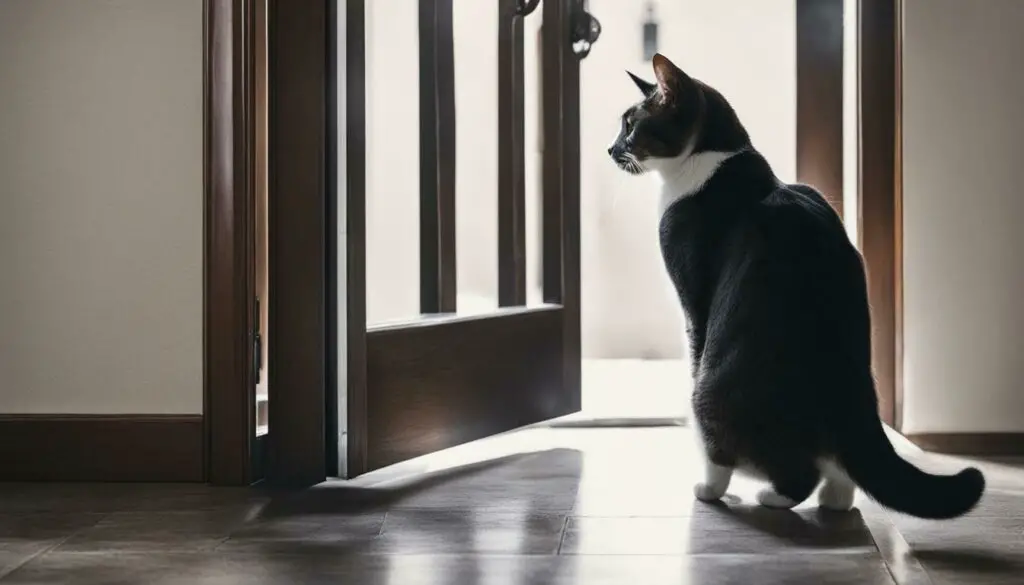
Keeping Doors Open Whenever Possible
To prevent distress, it is recommended to keep doors open for your feline friends. Cats’ aversion to closed doors stems from their curiosity and need to be involved in all family activities. Closed doors can be perceived as barriers to their territory, leading to frustration and attempts to scratch or meow their way in. Understanding that cats are not trying to annoy their owners but simply expressing their desire to be a part of every space is crucial.
By keeping doors open whenever possible, you can alleviate your cat’s distress and foster a positive environment. They will feel included and allowed to explore their surroundings freely. This simple adjustment can go a long way in maintaining a harmonious relationship with your feline companion.
“Cats use their subtle behaviors to communicate with us, and scratching or meowing at closed doors is their way of expressing their desire to be included. It’s essential for cat owners to recognize this and accommodate their needs.”
In addition to keeping doors open, providing alternative spaces and activities for your cat can also help redirect their attention away from closed doors. Creating vertical spaces, such as cat trees or shelves, can offer new vantage points for them to explore. Engaging toys and interactive playtime can also keep them mentally and physically stimulated.
It’s important to note that if your cat’s behavior suddenly changes or is accompanied by signs of distress, such as excessive scratching or aggression, it is recommended to consult a veterinarian or veterinary behaviorist. They can help identify any underlying issues and provide guidance on how to address them effectively.
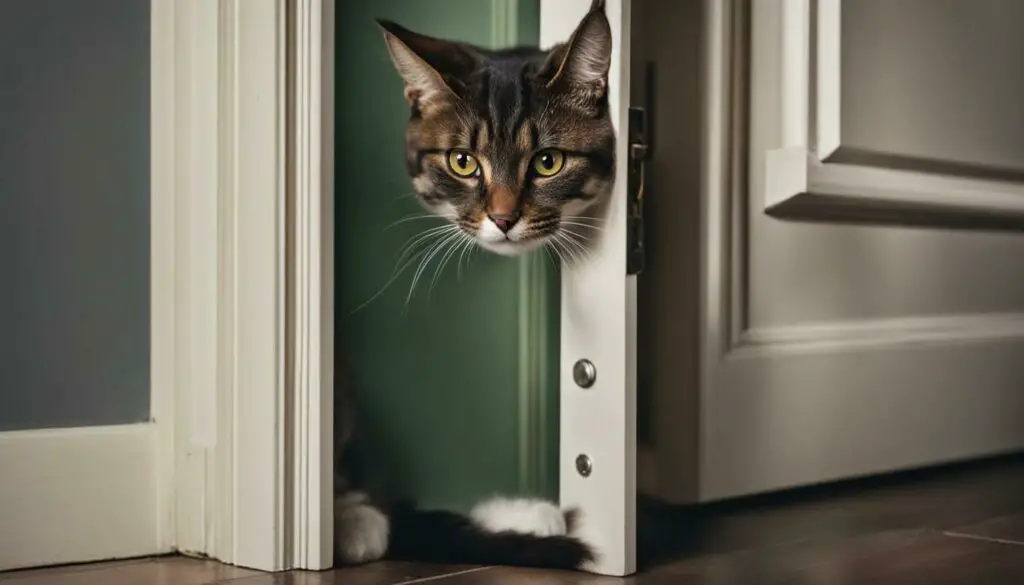
Summary:
- Cats’ aversion to closed doors is driven by their curiosity and desire to explore what is happening behind them.
- They perceive closed doors as barriers to their territory and may scratch or meow to express their desire to be included.
- Keeping doors open whenever possible can alleviate their distress and promote a positive relationship.
- Providing alternative spaces and activities can redirect their attention away from closed doors.
- If a cat’s behavior suddenly changes or is accompanied by signs of distress, it is best to consult a veterinarian or veterinary behaviorist.
| SEO Keywords | Tags Used |
|---|---|
| cats dislike closed doors | <img alt=”cats dislike closed doors” /> |
| understanding cats’ hatred for closed doors | <h2>, <blockquote> |
When Behavior Changes Suddenly
If your cat’s behavior takes a sudden turn, it may be time to consult a professional. While cats’ aversion to closed doors is a common quirk, significant changes in behavior could indicate an underlying issue that needs attention. Cats are generally curious and social animals, but sudden aggression, excessive scratching, or increased vocalization can be signs of distress or discomfort.
Consulting a veterinarian or veterinary behaviorist is crucial in these situations. They can help determine the cause of the behavior change and provide guidance on how to address it. Sometimes, medical conditions such as pain or illness can manifest in changes to a cat’s behavior, and a thorough examination will help rule out any underlying health issues.
A professional will also be able to assess your cat’s environment and provide recommendations on how to make it more conducive to their needs. This may involve creating additional spaces for exploration, providing mental and physical stimulation, or implementing behavior modification techniques. With their expertise, they can help you understand your cat’s unique needs and work towards resolving any behavioral issues.
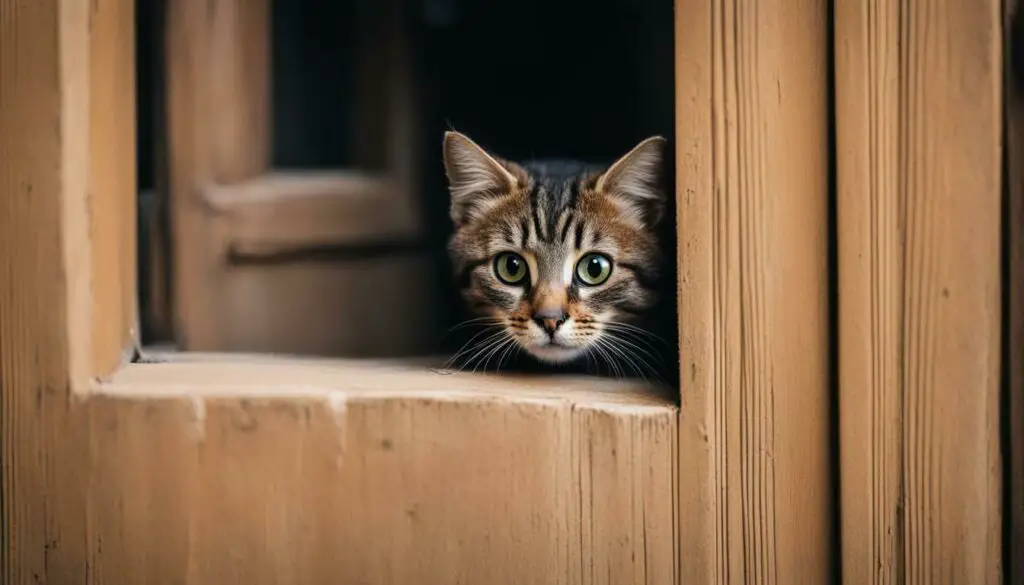
Seeking Professional Help for a Happier Cat
Remember, your cat’s aversion to closed doors is not a deliberate attempt to annoy you. It is crucial to approach any changes in behavior with empathy and seek professional help when necessary. By consulting a veterinarian or veterinary behaviorist, you can ensure that your feline companion receives the care and support they need to lead a happier and more fulfilling life.
Summary:
- Cats’ aversion towards closed doors stems from their curiosity and social nature.
- Sudden changes in behavior could indicate an underlying issue that requires professional attention.
- Consulting a veterinarian or veterinary behaviorist is crucial to rule out medical conditions and address behavioral concerns.
- Professionals can assess the cat’s environment and provide recommendations tailored to their needs.
- Approaching behavioral changes with empathy and seeking professional help leads to a happier cat.
| Behaviors to Watch For | Possible Causes | Recommended Actions |
|---|---|---|
| Excessive scratching or aggression | Pain, illness, stress | Consult a veterinarian for a thorough examination |
| Increased vocalization | Discomfort, anxiety | Seek professional advice to address underlying issues |
| Changes in appetite or litter box habits | Medical conditions | Consult a veterinarian to rule out any health concerns |
Consulting a Veterinarian or Behaviorist
Seeking professional advice is crucial to addressing the underlying causes of your cat’s dislike for closed doors. While it is common for cats to exhibit this behavior, sudden changes in their behavior or signs of distress should not be ignored. Consulting a veterinarian or veterinary behaviorist can help you understand and address any potential issues that may be causing your cat’s aversion.
When you consult a veterinarian or behaviorist, they will assess your cat’s overall health and behavior to determine the underlying factors contributing to their dislike of closed doors. They may ask you questions about your cat’s history, living environment, and any recent changes that could be affecting their behavior.
Based on their assessment, the veterinarian or behaviorist will develop a personalized plan to address your cat’s aversion to closed doors. This may include behavioral modifications, environmental enrichment, or medical interventions, depending on the individual needs of your cat.
Remember, every cat is unique, and their aversion to closed doors may stem from various factors. By consulting a professional, you can gain valuable insights into your cat’s behavior and take the necessary steps to create a harmonious environment for both you and your feline friend.
Table: Signs of Distress in Cats
| Behavioral Signs | Physical Signs |
|---|---|
|
|
Understanding your cat’s behavior and addressing their aversion to closed doors can greatly improve their quality of life and strengthen your bond with them. Don’t hesitate to seek professional guidance to ensure your cat’s well-being and happiness.”
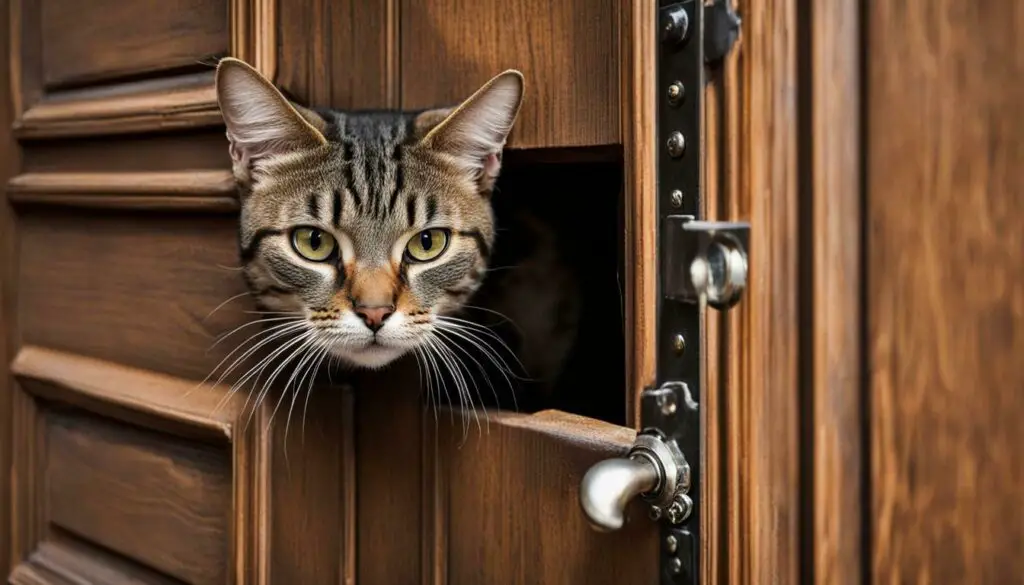
Uncovering Feline Quirks
Cats have their own set of quirks that make them fascinating and sometimes perplexing creatures. One such quirk is their aversion towards closed doors. Have you ever wondered why cats dislike closed doors? Exploring the reasons behind this behavior can shed light on their unique personality.
Curiosity is a defining trait of cats, and it plays a significant role in their dislike for closed doors. They are instinctively driven to investigate what lies behind those mysterious barriers. Whether it’s a closed room or a closet, cats can’t resist the urge to explore and satisfy their inquisitive nature. Their curiosity is sparked, and they will do whatever it takes to gain access to the closed-off area.
Furthermore, cats are social creatures that thrive on companionship. Closed doors can be perceived as a hindrance to their desire to be part of the family activities. They want to be included in every space and feel a sense of belonging. Scratching at closed doors or meowing are their ways of expressing their desire to join the action and be by your side. Understanding their need for inclusion can help you create a harmonious environment for both you and your feline friend.
To alleviate a cat’s distress caused by closed doors, it is advisable to keep them open whenever possible. This allows cats to freely roam and explore their surroundings, satisfying their natural instincts. By accommodating their needs, you can create a more contented and happy feline companion. However, it is important to note that if your cat’s behavior suddenly changes or if they display signs of distress, it is best to consult a veterinarian or veterinary behaviorist to address any underlying issues that may be contributing to their aversion towards closed doors.
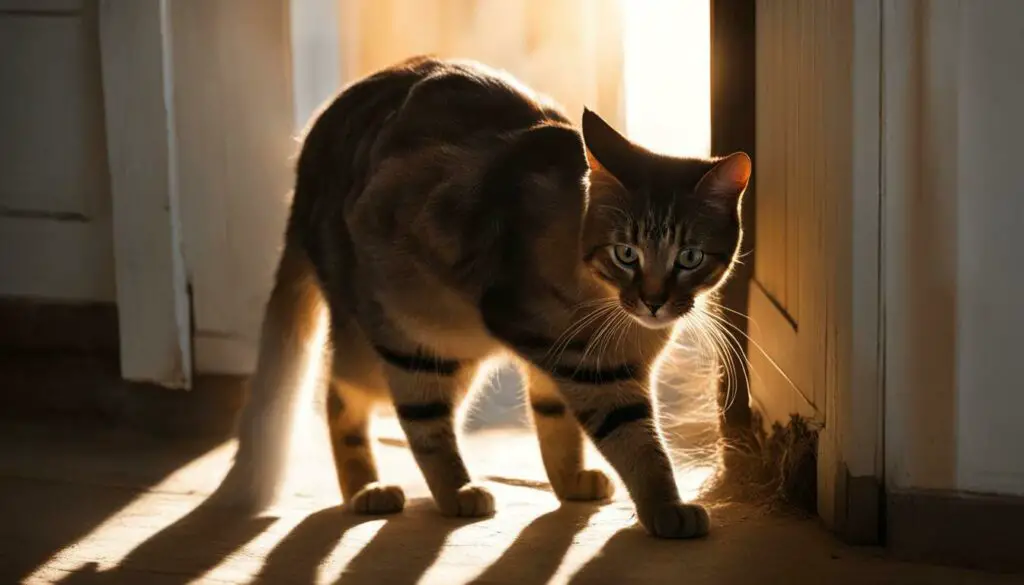
| Reasons for Cats Disliking Closed Doors | Solutions |
|---|---|
| Curiosity and Need for Exploration | Provide alternative outlets for exploration, such as interactive toys and scratching posts. |
| Desire for Inclusion | Keep doors open whenever feasible to allow your cat to feel part of the family. |
| Expressing their Needs | Engage in regular playtime and provide interactive activities to keep your cat mentally stimulated. |
| Seeking Professional Help | If behavior changes suddenly or signs of distress are present, consult a veterinarian or veterinary behaviorist for guidance. |
“I have found that understanding my cat’s quirks, including their dislike for closed doors, has helped strengthen our bond and create a more harmonious living environment.” – Cat Owner
Embracing Feline Individuality
Every cat is unique, with their own preferences and quirks. When it comes to their dislike of closed doors, it’s essential to remember that cats have their reasons for behaving the way they do. Understanding and accepting their individuality can help foster a stronger bond between you and your feline friend.
Cats’ aversion to closed doors can stem from their innate curiosity. They are naturally inquisitive creatures, always wanting to explore and investigate their surroundings. Closed doors represent a mystery to be solved, and your cat’s determination to discover what lies behind them is merely an expression of their curiosity.
As social animals, cats crave companionship and want to be involved in all family activities. Closed doors can be perceived as a barrier, preventing them from participating in the daily interactions and routines of their human companions. When your cat scratches or meows at a closed door, they are trying to communicate their desire to be included in the space and the activities happening behind it.
It’s important to acknowledge that cats’ aversion to closed doors can be frustrating. However, they are not intentionally trying to annoy their owners. Instead, they are expressing their needs and seeking connection. Keeping doors open whenever possible allows cats to feel more included and reduces their distress.
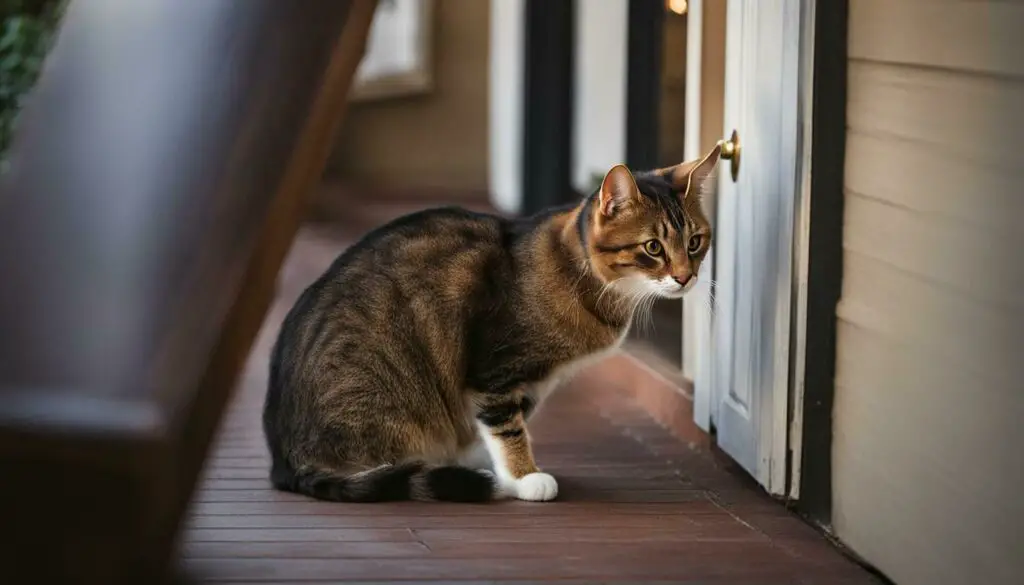
If your cat’s behavior suddenly changes or is accompanied by signs of distress, it may be wise to seek professional help. Consulting a veterinarian or veterinary behaviorist can help identify any underlying issues that may be causing their aversion to closed doors. They can provide guidance and support to ensure your cat’s well-being and address any concerns you may have.
Remember, embracing your feline companion’s individuality, quirks, and even their dislike of closed doors, can lead to a happier and more fulfilling relationship. By understanding their unique needs, you can create an environment that caters to their preferences and allows both of you to enjoy a harmonious life together.
Enjoying Life with Your Feline Friend
By understanding and accepting your cat’s behaviors, you can build a stronger bond and enjoy a more fulfilling life together. Cats’ aversion to closed doors is just one of the many quirks that make them unique and fascinating companions. Embracing these quirks can lead to a deeper understanding of your feline friend and a happier coexistence.
When your cat scratches at a closed door or meows persistently, it’s not an attempt to annoy you. Instead, it’s an expression of their desire to be involved in every aspect of your life. They long to explore and investigate what lies behind that closed door, driven by their insatiable curiosity.
Open communication and compromises can go a long way in alleviating your cat’s distress. Whenever possible, try to keep doors open to allow them access to different spaces within your home. Not only will this help satisfy their natural instincts, but it will also create a sense of inclusion and belonging for your feline companion.
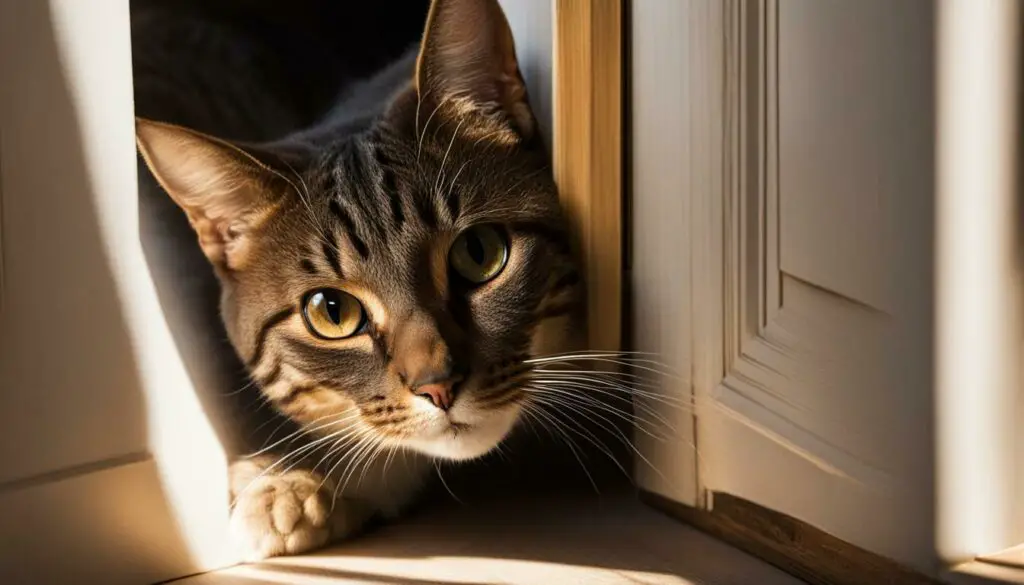
Scent-Marking: A Fascinating Feline Behavior
One interesting aspect to consider is scent-marking. Cats are known to use their scent to mark their territory and communicate with other cats. Closed doors can hinder this behavior, causing your cat to feel a sense of territorial unease. By understanding this instinctive need, you can provide alternative outlets for scent-marking, such as scratching posts or interactive toys.
In some cases, a sudden change in your cat’s behavior towards closed doors may indicate an underlying issue. If your cat becomes excessively agitated or shows signs of distress, it is important to consult a veterinarian or veterinary behaviorist. They can help identify any potential medical or behavioral problems and provide appropriate solutions to ensure your cat’s well-being.
Remember, embracing your cat’s individuality and understanding their quirkiness is essential to cultivating a harmonious and enjoyable life together. By providing a safe and stimulating environment, keeping a watchful eye on their behavior, and seeking professional help when needed, you can create a loving and fulfilling relationship with your feline friend.
Conclusion
Cats’ aversion to closed doors is a common quirk that can be better understood and managed through empathy and patience. Factual data supports the notion that this behavior is driven by natural feline instincts. Cats are curious creatures by nature, and their dislike of closed doors stems from their desire to explore and investigate what lies behind them.
Additionally, cats are social animals that crave inclusion in their family’s activities. Closed doors can be perceived as barriers to their territory, causing them to express their desire to be part of every space by scratching or meowing at the door.
It’s important to note that cats are not intentionally trying to annoy their owners with their dislike of closed doors. Instead, they are expressing their natural instincts and needs. To alleviate their distress, it is recommended to keep doors open for cats whenever possible, allowing them access to the areas they want to explore.
However, if a cat’s behavior suddenly changes or is accompanied by signs of distress, it is advisable to seek professional help. Consulting a veterinarian or veterinary behaviorist can help identify any underlying issues and provide appropriate guidance to address the cat’s aversion to closed doors.
By embracing feline individuality and understanding their unique quirks, including their dislike of closed doors, cat owners can foster a positive relationship with their furry companions. Remember, cats’ aversion to closed doors is a part of who they are, and by accepting and accommodating their needs, we can enjoy a happier life with our feline friends.
FAQ
Why do cats hate closed doors?
Cats’ aversion towards closed doors is driven by their curiosity and desire to explore what is happening behind them. They are social creatures and want to be involved in all family activities, perceiving closed doors as a barrier to their territory.
What makes cats dislike closed doors?
Cats dislike closed doors because they want to be a part of every space and feel included. They may scratch or meow at closed doors as a way to express their desire to be involved in what is happening on the other side.
How can I alleviate my cat’s distress caused by closed doors?
Keeping doors open for cats whenever possible can help alleviate their distress. This allows them to freely explore and be a part of the household activities. However, sudden changes in behavior or signs of distress should be addressed by consulting a veterinarian or veterinary behaviorist.
Should I consult a professional if my cat’s behavior towards closed doors suddenly changes?
Yes, it is best to consult a veterinarian or veterinary behaviorist if your cat’s behavior towards closed doors suddenly changes or is accompanied by signs of distress. They can help identify any underlying issues and provide appropriate guidance.
How can I embrace my cat’s aversion to closed doors?
Embracing your cat’s aversion to closed doors means understanding and accepting their individuality. Cats have unique quirks, and their dislike of closed doors is just a part of who they are. Enjoying life with your feline friend involves appreciating their quirks and finding joy in their company.

